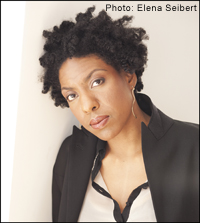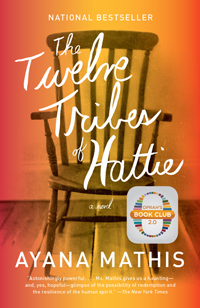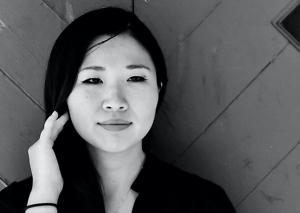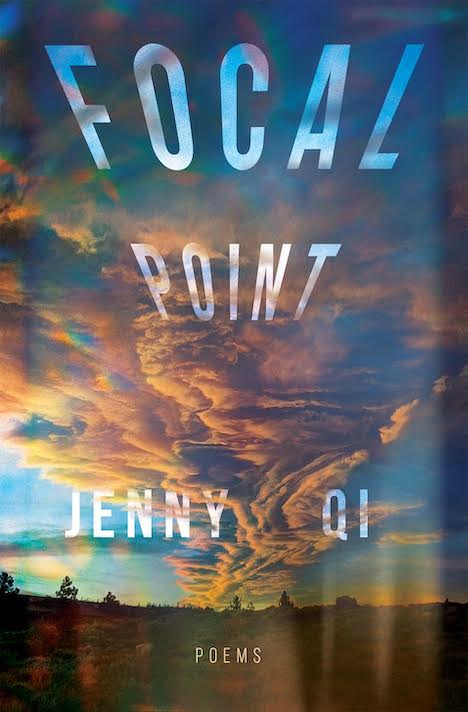Reckoning with Mystery
Ayana Mathis discusses the mysteries of human experience, including her novel’s elusive protagonist
At the center of Ayana Mathis’s debut novel, The Twelve Tribes of Hattie, is a lead character who fled Jim Crow Georgia in 1925 for the promise of a better life in Philadelphia. Each chapter reveals the story of Hattie Shepherd’s children—eleven of her own and one grandchild. In a structure reminiscent of Elizabeth Strout’s Olive Kitteridge, this highly episodic novel builds a rich but subtle portrait of its enigmatic protagonist. Hattie’s withholding nature makes her children long for her all the more, and every small detail that emerges about Hattie from their stories becomes a clue to her elusive inner life.
 Before entering the Iowa Writers’ Workshop, Mathis had spent years as a fact-checker for magazines. Her turn to fiction paid off last December, when Oprah Winfrey chose The Twelve Tribes of Hattie as the first book in her Book Club 2.0, an event that catapulted the book onto The New York Times bestseller list. Prior to her appearance at the Southern Festival of Books, Mathis answered questions from Chapter 16 via email:
Before entering the Iowa Writers’ Workshop, Mathis had spent years as a fact-checker for magazines. Her turn to fiction paid off last December, when Oprah Winfrey chose The Twelve Tribes of Hattie as the first book in her Book Club 2.0, an event that catapulted the book onto The New York Times bestseller list. Prior to her appearance at the Southern Festival of Books, Mathis answered questions from Chapter 16 via email:
Chapter 16: Hattie Shepherd embodies tough, unsentimental motherhood. As her eleven children take their turn as the focus of the novel, their unfulfilled hunger for a mother’s love emerges as a major driving force in their lives. How did Hattie develop as a character?
Ayana Mathis: Hattie is so enormous and complex and intimidating as a character. Sometimes I still fear I haven’t done her justice. Early on it was clear I couldn’t know her by approaching her head-on, on the occasions I tried to do that I reduced her to clichés. She’s very resistant to any kind of self-analysis, and she’s so fiercely private that she can only be described by observing her interactions with the people she loves—August and her children.
Chapter 16: With so many narrative threads to work with, how did you strike a balance between making sure each episode functions internally while also building the book’s larger story into a satisfying whole?
Mathis: I was very lucky in discovering the novel’s structure so early in the process—the structure dictates the way the novel functions as a whole. Each chapter has its own narrative arc, and it is also the case that Hattie is present within each of these discrete units. As the stories moved forward chronologically it was quite natural for Hattie and her fortunes, or misfortunes, to move forward along with them. Hattie provides the continuity, and momentum, that makes these stories cohere into a novel.
Chapter 16: Hattie’s life is entwined with the much larger story of the Great Migration. What are the challenges of writing good fiction, which depends on the local and the particular, when the cultural and historical context of the subject matter is so vast?
 Mathis: The answer to that question is within the question as you phrased it: good fiction depends on the local and the particular. To put a finer point on it, good fiction depends on characters and good characters are not symbols, nor are they ciphers in service to an agenda. It is possible to write about anything, however large or complex, through the specificity of individual experience.
Mathis: The answer to that question is within the question as you phrased it: good fiction depends on the local and the particular. To put a finer point on it, good fiction depends on characters and good characters are not symbols, nor are they ciphers in service to an agenda. It is possible to write about anything, however large or complex, through the specificity of individual experience.
Chapter 16: Your characters constantly cross big dividing lines—the Mason Dixon Line, lines of social class, or lines of a more spiritual nature, like the ones separating sanity from insanity, or life from death. And there always seems to be a big spiritual toll to pay. Is there something about these intersections between physical and spiritual life that particularly attracts you as a writer?
Mathis: It’s not so much the crossing from one state to another that interests me but what it takes to get to that point of crossing—the event horizon, to borrow a term—and what happens in those liminal spaces. Most of the action in the book takes place in moments like that, when the characters are on the threshold of something.
The fact of the matter is that we don’t know much about the world we inhabit; we don’t even know what will happen in the next five minutes. We can make a pretty good guess, but we don’t know. The world is a mystery; our own being is mysterious. We carry on, out of necessity, as though that weren’t the case. I’m interested in those moments during which we are unable to summon certain pretexts of control or knowledge. There is something powerful and beautifully human, something deeply true, about reckoning with the magnitude of the mystery in which we live.
Chapter 16: You began as a poet. When and how did you know that your voice and subject matter were leading you toward fiction?
Mathis: I stopped writing poetry in my mid-twenties. It wasn’t a choice; it was as though something in me clicked off. I didn’t write at all for several years after that. I was bereft during that time—prose, let alone fiction, hadn’t occurred to me. When I started writing again, I was making language-driven vignettes about my childhood. Writing them was a great exercise, but they wouldn’t cohere into a larger whole. I decided, largely because I wanted to apply to M.F.A. programs, to fictionalize them. Of course, that project was eventually abandoned—those vignettes were still too close to my personal experience—but that is how I got to the idea of fiction.
Chapter 16: Having your debut chosen by Oprah Winfrey must have been quite an intense whirlwind. Now that the better part of a year has passed, what do you think about that experience?
Mathis: I don’t think I’ve gotten enough perspective on the whirlwind to assess it in any real way. I suspect it’ll take me a few years to metabolize the whole thing. For now all I can say is that it’s been a miracle—a joyous, sometimes overwhelming, sometimes terrifying, sometimes exhilarating miracle.
Chapter 16: In previous interviews, you mentioned that you were working on some essays about faith and belief, as well as circling the beginnings of a new novel. Is there anything you’d be willing to share about either of those projects?
Mathis: Oh, I always feel like such a spoilsport when I say I don’t want to talk about them. But, uh, well…. Both are too embryonic for me to run my mouth about them.
Ayana Mathis will discuss The Twelve Tribes of Hattie at the twenty-fifth annual Southern Festival of Books, held in Nashville October 11-13, 2013. All festival events are free and open to the public.





